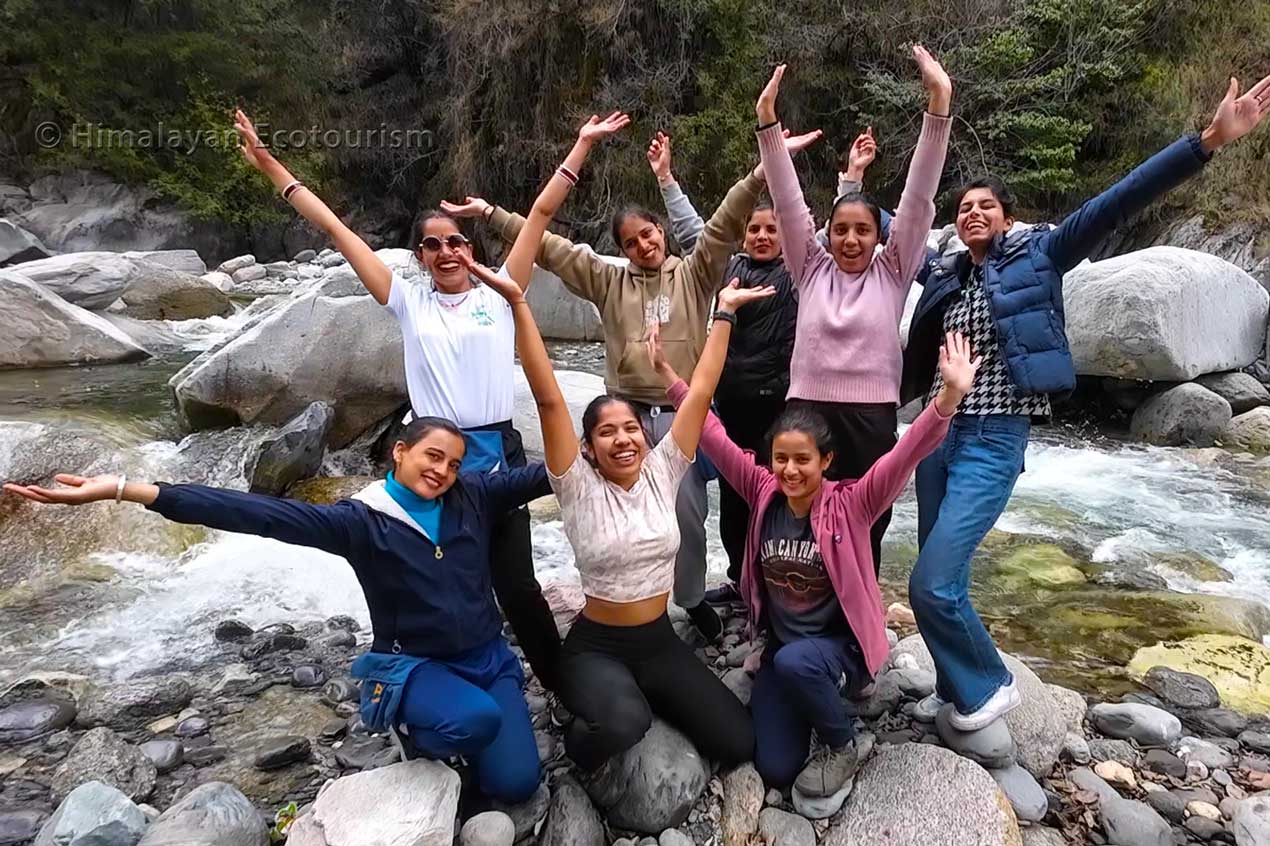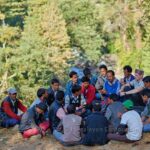L'autonomisation des femmes pour la conservation
Par Stephan, fondateur de Heco et Himalayan Ecotourism
Cet article a conduit à la rédaction de «Construire un avenir durable : le rôle possible des entreprises dans le bien-être économique et la conservation“
Depuis des décennies, l'Occident est à l'avant-garde de la défense de l'égalité, notamment de l'égalité des sexes. Ayant grandi en Europe, je n'ai jamais remarqué de différence significative entre les hommes et les femmes, à part peut-être que les filles préféraient les poupées et les garçons les petites voitures, ce qui est sans doute un vestige de l'histoire patriarcale de l'Europe.
Cependant, lorsque je suis arrivée en Inde, j’ai découvert que les choses étaient bien différentes. Naître fille ou garçon en Inde fait une différence significative. Le statut social des hommes et des femmes est inégal, la société indienne favorisant généralement les hommes, en particulier dans les zones rurales. Les femmes sont généralement éduquées pour devenir de bonnes ménagères, cuisinières et éducatrices pour leurs enfants.
Cette distinction entre hommes et femmes renforce les rôles spécifiques à chaque sexeLes hommes présentent des attributs traditionnellement masculins, tandis que les femmes incarnent des qualités féminines – tout le contraire de ce que j’ai observé en Europe où les forces masculines et féminines sont plus équilibrées entre les deux sexes.
Il est important de reconnaître qu'associer les hommes à l'énergie masculine et les femmes à l'énergie féminine n'est pas aussi évident qu'il y paraît. Ces traits ne sont pas intrinsèquement liés au sexe d'une personne, mais sont façonnés par les attentes culturelles et le conditionnement social, qui peuvent varier considérablement selon les sociétés.
En Inde, le pouvoir féminin est plus nettement présent chez les femmes, profondément enraciné dans les normes culturelles qui les associent souvent à des qualités nourricières et préservatrices.
C'est ainsi qu'en Inde, j'ai appris à reconnaître le pouvoir féminin chez les femmes.
Je me souviens de ma première réunion dans le village tribal de Khumardi, dans le Jharkhand. Environ 50 villageois, hommes et femmes, y ont participé. Nous n'étions pas une grande ONG disposant de fonds importants, donc la discussion s'est concentrée sur la compréhension des défis actuels des villageois et sur la façon dont nous pourrions travailler ensemble pour envisager un avenir meilleur basé sur leur mode de vie traditionnel et la régénération des forêts.
Lors de la deuxième réunion, seules des femmes étaient présentes, un schéma qui s'est répété dans les 24 villages où nous avons travaillé. Cela m'a appris que prendre soin de l'avenir, pour les ressources et la compréhension du lien intime entre les bien-être d'une communauté et de la nature dans lequel ils vivent, est un typique attribut féminin.
Comme écologiste travaillant dans l'Inde rurale, j'en suis venue à croire que les femmes sont la clé de le développement durable parce qu'elles incarnent cette énergie féminine plus que les hommes pour les raisons que j'ai mentionnées.
Quand j'ai déménagé dans l'Himachal Pradesh pour commencer Himalayan Ecotourism, J'avais hâte de travailler avec les femmes locales. Cependant, le tourisme et le trekking étaient traditionnellement domaines à prédominance masculine. Néanmoins, j'avais besoin de maintenir mon entreprise, alors j'ai commencé à travailler avec les hommes, tout en cherchant des moyens alternatifs pour impliquer les femmes dans mon entreprise.
La société dans les villages reculés de l'Himachal Pradesh est extrêmement conservateurLes femmes se chargent de la plupart des tâches ménagères, ce qui rend difficile leur participation à d’autres tâches. De plus, les mécanismes au sein de leurs communautés les maintiennent dans un statut social inférieur. Des processus sociaux similaires existent dans le système des castes. Ceux qui ont des positions privilégiées – hommes et membres des castes supérieures – résister à tout changement ce qui pourrait menacer leur statut, perpétuant ainsi le conservatisme.
Il n’est pas surprenant de constater l’intense dégradation des écosystèmes dans la vallée de Tirthan, où je vis. Les anciens m’ont expliqué que les trois quarts des forêts avaient disparu depuis leur enfance.
Partout où les femmes ont un statut social inférieur, la dégradation de l’environnement est courante.
C'est pourquoi j'ai donné la priorité autonomisation des femmes. Pour œuvrer en faveur du développement durable, il faut se concentrer sur l’autonomisation des femmes, en particulier dans cette partie de l’Himalaya. Après des années d’efforts persistants, en 2024, Himalayan Ecotourism a réussi à identifier, former et autonomiser 10 femmes comme guides trekking pour le Great Himalayan National Park. Cette réussite est unique et marque la première fois que des femmes se voient confier de tels rôles dans la région, innovant dans un domaine traditionnellement réservé aux hommes.
Ce succès est dû à plusieurs facteurs. Himalayan Ecotourism a gagné une forte réputation parmi les habitants de la vallée de Tirthan pour notre travail en tant qu'entreprise sociale. Lorsque notre équipe a contacté ces femmes, confiance était déjà établie, ce qui a suscité une réponse positive. De plus, la plupart des femmes venaient de origines des castes inférieures, ce qui les rend plus progressistes. Les familles de castes inférieures acceptent souvent les changements qui remettent en question la hiérarchie sociale existante. Par conséquent, les familles de ces femmes étaient plus favorables, car elles comprenaient que briser le système des castes peut impliquer d'adopter d'autres idées progressistes.
L’élévation du statut social des femmes est une idée qui est tout simplement mieux acceptée dans les familles de basse caste.
Les résultats ont été remarquables. Après avoir mené leurs premiers treks avec des clientes, ces femmes rayonnaient une énergie puissante et une joie immense. Lorsqu'ils arrivent au bureau Himalayan Ecotourism le matin pour une randonnée, ils se transforment de caste inférieure, des femmes de statut inférieur transformées en super-héroïnes de l'autonomisation des femmes et des leaders en matière de conservation.
La première chose qu’ils font est de changer de tenue traditionnelle du village pour enfiler un pantalon et un t-shirt Himalayan Ecotourism, en arborant fièrement nos badges sur lesquels est écrit : « Je suis un défenseur des forêts himalayennes ». Une fois tout prêt, ils se dirigent vers le point de départ du trek, munis d’affiches pour notre campagne de prévention des incendies de forêt, qu’ils placent à des endroits stratégiques le long du chemin.
Ils rencontrent et saluent les clients et se lancent dans la randonnée, pour eux un voyage vers l'autonomisation et un avenir meilleur pour leur société.
Vous pouvez les observer en randonnée dans cette magnifique vidéo de Shivya Nath :







